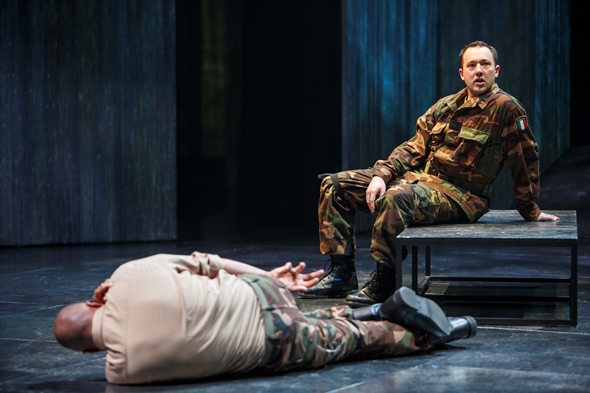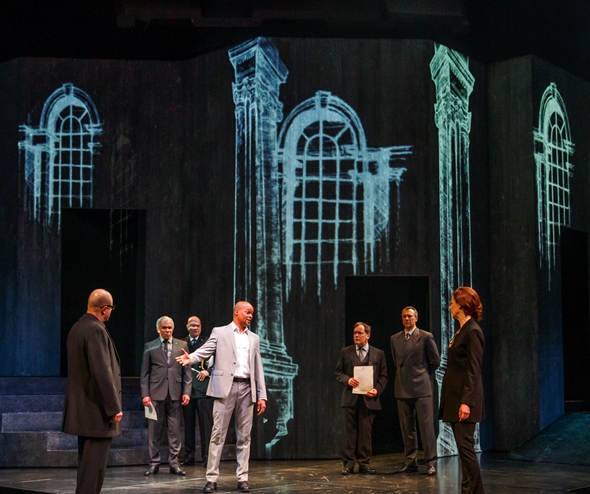Stratford Festival: Othello may be no match for Iago, but these two actors go toe to toe

His destruction of Othello (Michael Blake, on the floor) completed, Iago (Gordon S. Miller) pauses to admire his handiwork. (David Hou photo)
Review: “Othello” by William Shakespeare, at the Stratford Festival through Oct. 27. ★★★★★
By Lawrence B. Johnson
STRATFORD, Ontario – When the full, remorseless malevolence of Shakespeare’s villain Iago spills across the stage, it can be hard to find the title character in “Othello.” But even pitted against Gordon S. Miller’s sinister nemesis in the Stratford Festival’s current production, Michael Blake brings front and center both the heroic stature and the tragic vulnerability of a great general brought down by a handkerchief.
Smartly cast and briskly paced, this “Othello” directed by Nigel Shawn Williams is a splendid exercise in taut, clear story-telling. Iago, overlooked by Othello when the vaunted commander needs a new first officer, becomes our narrator of dark purpose: He will wreak unholy vengeance on the negligent Othello. He will grind him down and destroy him utterly – not overtly, but deftly, by indirection, by intimation. He will inflict a mortal wound in Othello’s most vulnerable place: the Moor’s absolute devotion to his beautiful new wife Desdemona. No matter how many times you come back to this play, to watch Iago so craftily infect Othello with soul-crushing jealously – and to see his victim so readily gulp that poison – is to be mesmerized and appalled all over again, in spite of yourself. The equal dramatic footing of Miller and Blake only renders the process the more stunning.

As the green-eyed monster jealousy gnaws at Othello (Michael Blake), his innocent wife Desdemona (Amelia Sargisson) can only wonder at their estrangement. (David Hou photo)
Blake cuts an immediately imposing and appealing figure as the formidable general who, having just won victory for Venice in one vital conflict, is again summoned to save the state from a new threat: He must confront the Turkish fleet off Cyprus. Once more, Othello prevails and takes command of Cyprus, with Desdemona at his side, the handsome young Cassio as his chief lieutenant and the bitter, plotting Iago – “honest” Iago, in whom Othello places total trust – standing by as his longtime friend and counselor.
As the serious-minded if naïve Cassio, Johnathan Sousa offers a winning foil – or perhaps puppet – in Iago’s clever machinations. First Iago sets Cassio up to embarrass himself and lose favor with Othello, then induces Desdemona to act on Cassio’s behalf to gain the lieutenant’s reinstatement. As Desdemona (the charming and blithely innocent Amelia Sargisson) pesters Othello with her advocacy for Cassio, Iago begins making oblique comments to Othello about something a bit unusual, even intimate, in the relationship between the general’s wife and his deposed lieutenant. Then a precious handkerchief, lost and “found” in a compromising place, seals Desdemona’s fate at the same time that it condemns Othello to ruin.

Much like Etch-a-Sketch, projections draw and redraw architectural backdrops as scenes change in Stratford’s modern-dress “Othello.” (Chris Young photo)
The great risk in staging this business, in one of Shakespeare’s most frequently produced plays, is familiarity and routine. Director Williams and his well-honed ensemble manage to sustain tension on a line one end of which we the viewers might well believe we’re holding. But a jolt of electricity, a sense of theatrical surprise that happens it plain sight, surges through it. We’re caught up in Miller’s honeyed web along with Othello, amazed by Iago’s ruthlessness and empathic with the valiant soldier’s weakness. The brutal turning point comes when Blake’s Othello, convinced that he’s seen incontestable proof of his wife’s infidelity, crumples to the floor in a paroxysm. As Blake writhes helplessly, Miller reclines on a bench to relish his handiwork. That dramatic flourish is one of the great moments in theater, the triumph of evil, and it always leaves me wishing Shakespeare had capped it with the line of consummate contempt that Verdi’s librettist Arrigo Boito later hit upon for “Otello,” their towering opera: “Ecco il Leone.” Behold the lion.
Desdemona meets a violently physical end at Othello’s hands here. (Iago helpfully suggests how the shattered man might put out her light.) At least he doesn’t shoot her in this modern-dress account. I really don’t think the time frame matters much. What does make an impression is the unexpurgated text Williams uses, in which the racial overtones associated with Othello’s blackness emerge starkly and pointedly as a plain-spoken mix of outright bigotry and condescension. While it’s quite unsettling to hear, this graphic text only heightens the Moor’s vulnerability to Iago’s innuendos regarding his white wife.
The “set” bears noting. It is created substantially – or more to the point, insubstantially – as a sort of Etch-a-Sketch in white line drawings that are erased and redrawn with changes in scene. It’s as clever as it is sufficient, and quite in keeping with the fresh aspect of the whole enterprise.
Related Links:
- Performance and ticket info: Details at StratfordFestival.ca


1 Pingbacks »